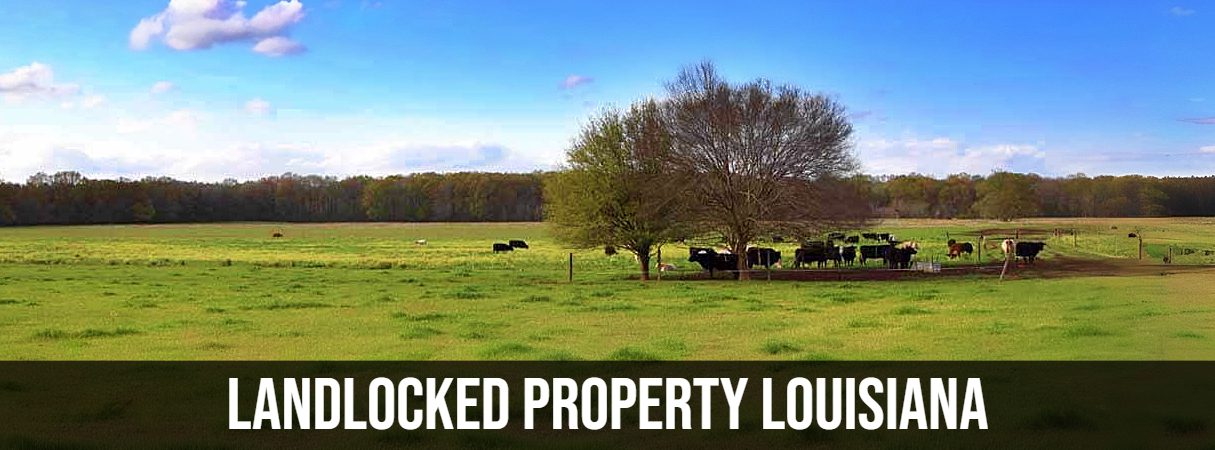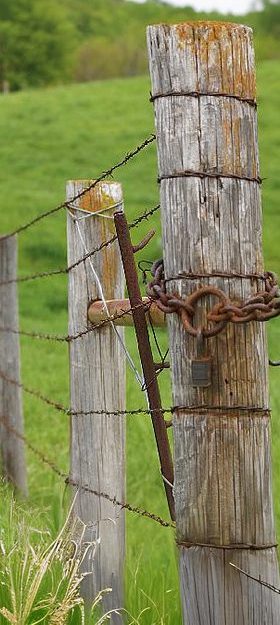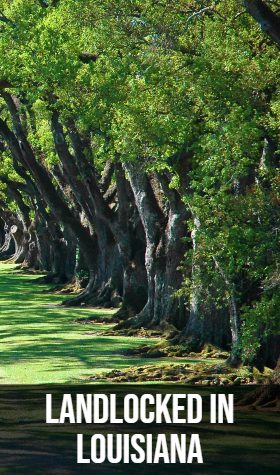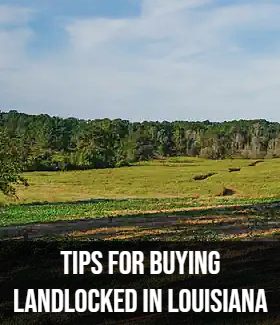
When you think of Louisiana, lively jazz, spicy gumbo, or maybe even a wandering alligator might come to mind. What you probably don’t picture is being stuck with a piece of land that doesn’t have any road access. That’s the tricky reality of landlocked property Louisiana! While it might sound like a headache, owning landlocked property doesn’t have to mean you’re out of luck. It just means you’ll need to get a little creative—and probably work on your negotiation skills with the neighbors. So, let’s dive into what you need to know to turn your landlocked situation into an opportunity.

What is Landlocked Property in Louisiana?
Landlocked property is like having a private island… minus the water and the ease of getting to it. Essentially, it’s a piece of land that has no legal access to public roads, making it a bit tricky when it comes to driving up to your future dream cabin or investment property. In Louisiana, this can happen more than you think, especially in rural areas where the land is carved up in ways that might make you scratch your head. You’ll want to understand the legal landscape before jumping into a landlocked deal—because it’s not as simple as just knocking down a few trees and calling it a driveway.
Challenges of Owning Landlocked Property in Louisiana
Owning landlocked property sounds mysterious, doesn’t it? But instead of buried treasure, you’ll find a few challenges that can be… let’s say, inconvenient. In Louisiana, the beautiful bayous and thick marshes only add to the adventure. The good news is that solutions exist, but they’ll require patience, paperwork, and perhaps a few neighborly negotiations.
Louisiana’s Unique Geography & the Impact on Landlocked Property
The geography of Louisiana is a beast of its own. Swamps, rivers, bayous, and dense forest cover can make even a basic land deal more complicated. Picture this: you finally get the land of your dreams, but the only access involves kayaking through a marsh, dodging gators, and setting up camp just to check the mail. Yep, that’s Louisiana for you! The layout of the land here means that some properties are nestled in places that feel a little too “off the grid.”
Legalities of Landlocked in Louisiana: Easements & Access Rights
Legal access is everything when it comes to landlocked property. Without it, your property is just a glorified patch of grass (or swamp, depending on where you are). Easements, or servitudes as they’re known in Louisiana’s Napoleonic Code, are the key to unlocking access to your property. These legal agreements allow you to cross over someone else’s land to get to yours, and they can be established through negotiation, purchase, or—if you’re feeling bold—by taking legal action. Securing this right before buying landlocked property in Louisiana is crucial unless you want to get really good at canoeing.
Pros & Cons of Purchasing Landlocked Property Louisiana
So, you’re thinking about buying landlocked property in Louisiana? It’s not all swamps and alligators—there are some benefits too! But like everything else in real estate, there are pros and cons to weigh before you sign on the dotted line.
Pros: Landlocked Property Comes at a Lower Price
If you’re a savvy buyer, the lack of access might actually be a golden opportunity. Landlocked properties typically come at a lower price per acre compared to their easily accessible counterparts. It’s like buying a fixer-upper house—except the “fixing” involves finding a way to drive to it. Whether you’re looking to invest or just find some secluded space away from the noise, the price tag could be appealing.
Cons: Difficulties in Establishing Access Rights
On the flip side, that bargain price comes with its challenges. Establishing access isn’t always easy, and in some cases, it’s a downright headache. Negotiating with neighbors for an easement can feel like a game of Monopoly, and not the fun part where you buy hotels. You might deal with stubborn landowners, unclear property lines, or even disputes over who maintains the road (assuming you get one). If you’re up for a challenge, though, it can be worth the effort.

How to Secure Easement Rights in Louisiana
Getting access to your landlocked property isn’t as simple as asking nicely (although that’s a good start). Whether you’re negotiating with neighbors or seeking a legal solution, securing an easement is the top priority. Here’s how it’s done.
Negotiating with Neighbors for Easement Rights
First things first: put on your nicest smile. Often, the easiest way to get access to your landlocked property is through negotiation. Reach out to neighboring property owners and see if you can strike a deal. In most cases, landowners are reasonable and might even welcome the idea of a mutual benefit. You might offer to share the costs of road upkeep, or perhaps you throw in some of that famous Louisiana crawfish at the next neighborhood cookout. Whatever it takes!
Legal Routes: Obtaining a Prescriptive Easement in Louisiana
If neighborly negotiations don’t go as planned (hey, not everyone likes crawfish), you might have to go the legal route. In Louisiana, you can seek a “prescriptive easement,” which essentially allows you to gain access through continued use over a certain period of time. This legal process isn’t quick, and it’s best to consult a real estate attorney who knows Louisiana’s property laws inside and out.
Tips for Buying Landlocked Property in Louisiana

If you’re still game for buying landlocked property in Louisiana, good for you! Here are some practical tips to keep in mind before diving into the swamp… or the deal.
Research Local Access Laws in Louisiana
Make sure you understand Louisiana’s local laws about property access. Easements and servitudes are treated a bit differently here than in other states, so you’ll want to be well-versed in the rules before committing to anything. A little research goes a long way.
Work with a Local Real Estate Attorney
No DIY jobs here. Hire a real estate attorney who knows the ins and outs of Louisiana’s Napoleonic Code. They’ll help you navigate (not literally) the legal steps involved in securing an easement and ensure you don’t get stuck with a property that you can’t access.
Case Studies of Landlocked Properties in Louisiana
Now, let’s take a look at some real-life examples of how landlocked properties have been handled in the Pelican State. These case studies provide a snapshot of what you can expect if you find yourself in a similar situation.
Case Study 1: Resolving Access Issues in Calcasieu Parish
The Dupont family picked up a gorgeous 20-acre parcel of land in Calcasieu Parish, but there was one tiny problem—no access. After several months of negotiating with neighboring landowners, they were able to purchase an easement, and today, it’s a happy homestead with a shiny new gravel road. They had to sweeten the deal by offering shared road maintenance, but in the end, it worked out beautifully. Now, their dream of a quiet, secluded life in the bayou is a reality, complete with easy access for their weekly grocery runs.
Case Study 2: Finding a Bargain in St. Tammany Parish
In St. Tammany Parish, the LeBlanc family snagged a landlocked property at a steal. They worked with a sharp local real estate attorney to obtain a prescriptive easement after proving continued access to the land over several years. This wasn’t an overnight success—the process took nearly 18 months, but today, the property is worth nearly double the purchase price. Not bad for a landlocked deal, right? The LeBlancs even had enough left in their budget to build a small camp on the property for weekend getaways.
Case Study 3: Unlocking Access in Lafayette Parish
The Boudreaux family found themselves in a bit of a pickle when they purchased a 15-acre property in Lafayette Parish, completely unaware that it was landlocked. With no direct access and a stubborn neighboring landowner who wasn’t thrilled about granting an easement, they faced some tough decisions. However, after hiring a savvy negotiator (and perhaps sharing a few bottles of homemade gumbo), they were able to secure a legal easement.
Conclusion: Landlocked Property Louisiana
Landlocked property in Louisiana can be a fantastic investment—if you’re prepared to put in a little extra work. Sure, it comes with its challenges, but for the right buyer, the rewards can be sweet. The key to unlocking that potential (pun intended) is understanding the landscape, both literally and legally. If you have a love for a good real estate adventure and the patience to deal with easements and access rights, you might find yourself sitting on a hidden gem.
That said, it’s not a decision to rush into. Before you sign on the dotted line, make sure you’re crystal clear on the legal steps, especially when it comes to securing access. Getting a great deal on a property means nothing if you can’t get to it! This is where consulting a real estate attorney or a local expert can save you a ton of headaches down the road. They’ll help you navigate the maze of Louisiana’s property laws, keeping you on the right side of the legal swamp.
In the end, landlocked property in Louisiana is a niche investment, but it’s one that can offer big returns for those willing to tackle the quirks. Whether you’re buying for personal use, future development, or investment purposes, landlocked properties can be the road less traveled in real estate—and sometimes, that’s exactly where the treasure is buried.
Frequently Asked Questions (FAQs)

1. What Is Landlocked Property, And How Does It Affect Access Rights in Louisiana?
Landlocked property refers to land that has no direct access to public roads, which can complicate reaching the property. In Louisiana, you’ll need to secure an easement from neighboring landowners for access, either through negotiation or by legal action if necessary.
2. How Do I Obtain an Easement for Landlocked Property in Louisiana?
To obtain an easement, negotiate with neighboring landowners, offering compensation for the right-of-way. If negotiations don’t work out, you may need to file for an easement by necessity through the courts. Consulting a real estate attorney can help ensure the process is legally sound.
3. Can I Build on Landlocked Property in Louisiana?
Yes, you can build on landlocked property, but first, you need to secure legal access via an easement. You’ll also need to arrange access for utilities such as water, electricity, and sewage, which often requires a wider easement.
4. How Does Being Landlocked Impact the Value of a Property in Louisiana?
Landlocked properties typically have a lower market value due to the lack of direct access. This makes the property less attractive to potential buyers. However, obtaining legal access via an easement can significantly increase the property’s value.
5. What Legal Options Do I Have if a Neighbor Refuses to Grant Me an Easement in Louisiana?
If a neighbor refuses to grant an easement, you can seek legal recourse by filing for an easement by necessity. This requires proving that access is essential to the property’s use and was previously part of a larger tract.